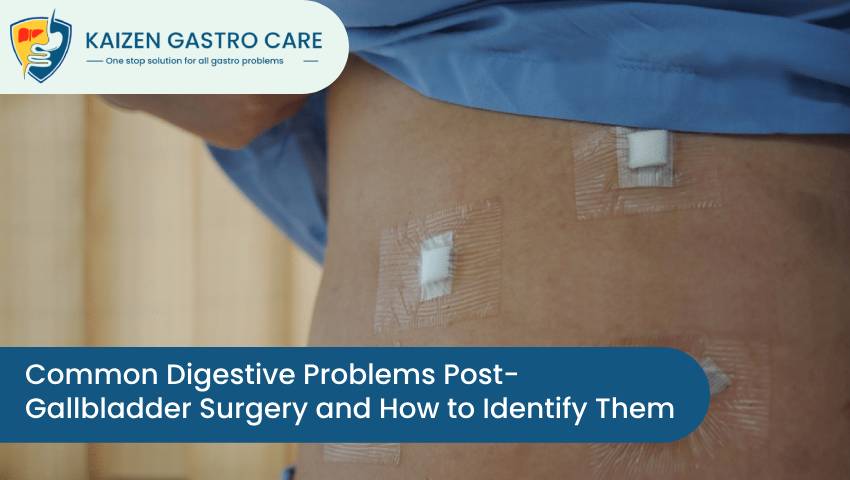
- 04/01/2025
- Kaizen Gastro Care
- 0 Comments
- Digestive Disorder
Common Digestive Problems Post-Gallbladder Surgery and How to Identify Them
Gallbladder surgery, also known as cholecystectomy, is a common technique performed to manage gallstones or gallbladder-related complications. While most patients recover smoothly, some may experience digestive issues post-surgery. Dr. Samrat Jankar, a leading gallbladder surgeon in Pune, India, at Kaizen Gastro Care, sheds light on these challenges and offers guidance on how to identify and manage them effectively.
Dr. Samrat Jankar and his team at the best gastroenterology clinic in Pune, Kaizen Gastro Care Clinic specialize in managing digestive problems following Post-Gallbladder Surgery. Using advanced diagnostic tools and personalized treatment plans, they help patients regain their digestive health and improve their quality of life.
Why Do Digestive Issues Arise Post-Gallbladder Surgery?
The gallbladder stores bile, a digestive fluid produced by the liver. After its removal, bile flows directly from the liver to the small intestine. This can sometimes result in changes to digestion, specifically in the initial weeks following surgery.
Common Digestive Problems Post-Cholecystectomy:
- Bile Reflux: After gallbladder removal, bile flows directly into the intestine, which can sometimes lead to bile reflux. This condition may cause signs such as:
- Heartburn
- Abdominal pain
- Nausea
- Diarrhea: Diarrhea is a common post-surgical problem caused by an increased flow of bile into the intestines, which may irritate the bowel. Symptoms include:
- Frequent loose stools
- Urgency to use the restroom
- Mild abdominal discomfort
- Indigestion: Some patients experience difficulty digesting fatty foods due to changes in bile flow. Symptoms of indigestion include:
- Bloating
- Gas
- Stomach cramps
- Fatty Stool (Steatorrhea): Without the gallbladder to regulate bile release, fat digestion may be harmed, leading to fatty or oily stools. Symptoms to watch for:
- Pale, foul-smelling stools
- Floating stools that are hard to flush
- Constipation: In contrast to diarrhea, some patients may experience constipation due to dietary changes or reduced physical activity post-surgery. Symptoms include:
- Difficulty passing stools
- Irregular bowel movements
- Abdominal discomfort
- Bloating and Gas: Without the gallbladder to regulate bile release, some patients may feel bloated or experience extreme gas.
How to Identify Digestive Problems?
- Monitor Symptoms: Keep track of symptoms like diarrhea, bloating, or abdominal discomfort, and note any food triggers.
- Dietary Changes: If symptoms worsen after eating specific foods, mainly fatty or spicy items, it may mean food intolerance.
- Consult a Specialist: Persistent or severe symptoms warrant a visit to a gastroenterologist to rule out complications like bile duct injury or small intestinal bacterial overgrowth (SIBO).
Tips for Managing Digestive Issues Post-Surgery:
- Adopt a Low-Fat Diet: Focus on lean proteins, whole grains, and vegetables to reduce digestion and relieve symptoms like diarrhea and bloating.
- Eat Smaller, Frequent Meals: Smaller meals are easier to digest and help regulate bile flow.
- Stay Hydrated: Drink plenty of water to control dehydration, especially if you experience diarrhea.
- Avoid Trigger Foods: Identify and avoid foods that worsen your symptoms, such as fried or processed items.
- Probiotics: Including probiotics can support gut health and improve digestion.
- Exercise Regularly: Engage in light physical activity to enhance gut motility.
- Medications and Supplements: Consult Dr. Samrat Jankar for medications to manage bile reflux or diarrhea. Enzyme supplements may also help digestion.
- Regular Follow-Ups: Schedule follow-up appointments with your gastroenterologist to monitor your recovery and manage persistent issues.
When to Seek Medical Attention?
If symptoms persist for more than a few weeks or significantly affect your quality of life, consult the best gallstone specialist in Pune, India like Dr. Samrat Jankar. Warning symptoms to watch for include:
- Intense abdominal pain
- Persistent nausea or vomiting
- Unintentional weight loss
- Yellowing of the skin or eyes
- Signs of infection, such as fever or chills
If you experience any of these signs, it is important to seek prompt medical attention.
Conclusion:
At Kaizen Gastro Care, Dr. Samrat Jankar and his team specialize in managing post-surgical digestive problems, ensuring patients achieve a smooth recovery and enhanced quality of life. If you’re experiencing discomfort after gallbladder surgery, don’t hesitate to reach out for expert care and personalized treatment options.
For more information or to book an appointment with Dr. Samrat Jankar, visit Kaizen Gastro Care Clinic today.
